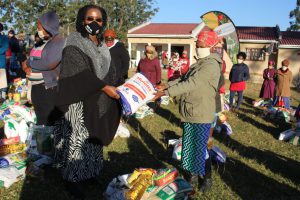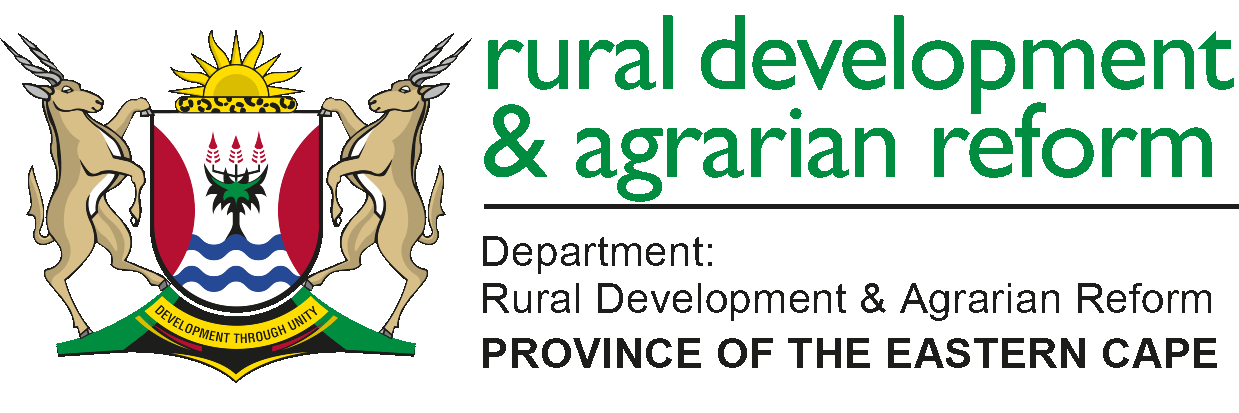
Cooperative governance brings relief to needy during COVID-19 pandemic
A TOTAL of 100 households in Ward 29 of Ngquza Local Municipality in Flagstaff were the latest social group to benefit from a social relief of distress programme put together through a collaborative effort by the amaMpondo king Zanozuko Sigcau, and two government departments, namely Health and that of Rural Development and Agrarian Reform. A social relief of distress is temporary provision of assistance intended for persons in such a dire material need that they are unable to meet their families’ most basic needs.
The 150 families coming from the most disadvantaged backgrounds of 10 villages which some of had gone a maximum of two days without a proper meal received food hampers with grocery items like rice, mealie-meal, sugar, cooking oil, samp and beans, teabags, salt, potatoes and other different ingredients of relish to go with their staple meals. The handing over of the packs took place at the Ndimakude Great Place on Saturday afternoon under strict observation of COVID-19 rules for gatherings with MEC for Rural Development and Agrarian Reform, Nomakhosazana Meth and king (Zanozuko) Sigcau in attendance. Leaders of the local and district municipalities had also formed part of Saturday’s proceedings.
The social relief of distress came after community health worker, Ntombekhaya Nodipha had asked for the king’s intervention in the families’ crisis early this year. According to Nodipha, the beneficiaries were selected based on need. “As I was doing my home visits to check if the patients were taking their treatment accordingly, I discovered that in some families there were individuals on daily treatment for chronic diseases like HIV, TB, cardiovascular diseases and many others. But what touched me the most was when I visited an elderly woman who stays with her grandchildren. In one of my visits I found the patient eating a hard mealie pap which he said was left for yesterday’s supper with sweetened water and on the second day she told me she hadn’t eaten for two days and as a result hadn’t taken her treatment,” said Nodipha. She said as she moved from one house to the next she learnt that there were many other families going through the same difficulty. “I immediately roped in the Department of Health and the king, but it was King (Zanozuko) Sigcau who wrote to the Department of Rural Development and Agrarian Reform asking for their mediation,” she added. Almost six months later the intervention in the form of groceries was delivered to the families.
MEC Meth said the food could not have come at the right time than now when many South Africans have been restricted from earning a living by themselves due to some of the COVOD-19 mitigation measures. “It makes me happy to see collaborations like these yield good results for the people. King (Zanozuko) Sigcau did exactly what traditional leaders should be doing which is be an extension of the government by being the eyes and ears of the government in the rural areas where our people don’t know which door to knock on for help. What Nodipha did is what we should all emulate and be the voice of those who cannot speak for themselves. The coordination is very much appreciated,” she said. Meth also seized the moment to speak against the rising cases of gender-based violence and educated the beneficiaries about the novel corona virus.
The beneficiaries were also given cloth facemasks and sanitizers to intensify the fight against COVID-19. In addition, the masks and sanitizers are produced by two institutes under the Department of Rural Development and Agrarian Reform, i.e. Dohne Agricultural Development Institute and Tsolo Agriculture and Rural Development Institute, respectively. Beneficiary, Nontle Sapulana said the food would come in handy because the little she could buy from her two grandchildren’s social grants couldn’t sustain them for a full month, especially during the period when schools had temporarily closed under the COVID-19 scare. “
The children would be provided with breakfast or lunch at school through the school’s nutrition programme. But now that the children are at home, they have to get all their three meals from their grant and this results in our groceries getting finished mostly on the third week of the month,” she said. The 49-year-old is currently on treatment for two chronic illnesses and is among those who’d go days without food and subsequently defaulted on their meds.

